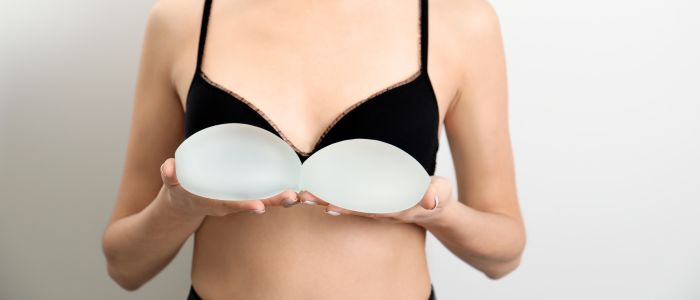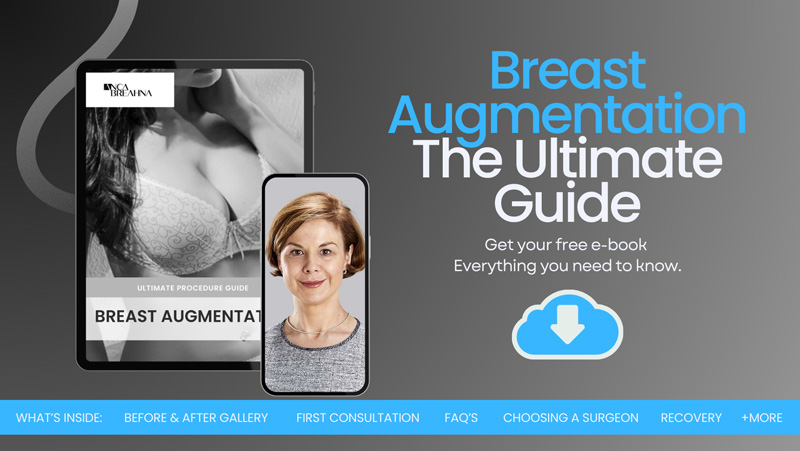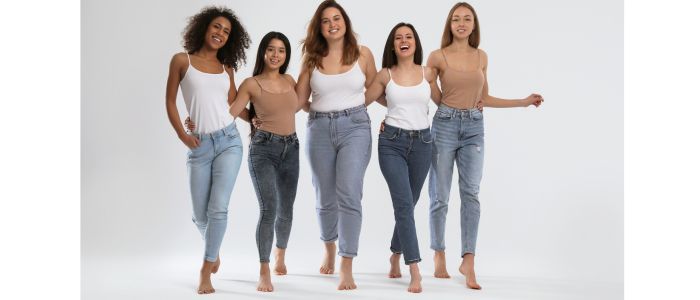
- What Are the Different Types of Breast Implants?
- Take our Plastic Surgery Quiz to find out if you'd be a good candidate for cosmetic surgery.
- What Are the Types of Breast Implants?
- 1. Saline Implants
- 2. Silicone Implants
- 3. Gummy Bear Implants
- 4. Round Implants
- 5. Anatomically Shaped Implants
- 6. Smooth Implants
- 7. Textured Implants
- Download Miss Anca Breahna's Breast Augmentation Surgery Guide
- Why There Are So Many Types of Breast Implants?
- 1. Individual Body Types and Aesthetics
- 2. Achieving Symmetry
- 3. Diverse Material Options
- 4. Different Lifestyles
- 5. Safety and Comfort
- Choosing the Breast Implants - Factors to Consider
- Breast Augmentation Before and After Photos
- Choosing the Right Surgeon for Breast Implants Surgery
- How to Find the Best Implant for Your Body and Lifestyle
- FAQs about Types of Breast Implants
- Further Reading about Breast Surgery with Consultant Plastic Surgeon Anca Breahna
What Are the Different Types of Breast Implants?
When considering the prospect of undergoing breast augmentation, the variety of available choices can seem daunting. Breast implants come in numerous shapes, sizes, and materials, each designed to fit the unique requirements and aesthetic goals of individual women. In this blog, we will explore the different types of breast implants to help provide a comprehensive understanding, empowering you to make the most informed decision.
Consultant Plastic Surgeon Anca Breahna combines her surgical acumen with a deeply empathetic approach, understanding the intimate and personal nature of each patient’s decision to pursue cosmetic surgery. As a female surgeon, she offers a unique perspective, addressing the concerns and desires of her patients with unparalleled sensitivity and respect. Her relentless dedication to her craft, coupled with her relentless commitment to her patients’ satisfaction, makes her one of the most respected figures in the field. She takes pride in being one of the few leading female Plastic, Reconstructive, and Cosmetic surgeons in the UK, serving communities primarily across Cheshire, Merseyside, North Wales, and The Wirral.
Take our Plastic Surgery Quiz to find out if you’d be a good candidate for cosmetic surgery.
What Are the Types of Breast Implants?
1. Saline Implants
Saline implants were the first kind to be used for breast augmentation. They have an outer silicone shell and are filled with sterile saline, which your body can naturally absorb if the implant ruptures. A primary benefit of saline implants is that they can be inserted while empty and filled once they’re in place. This flexibility allows for smaller incisions. Moreover, the volume can be adjusted after placement, which is beneficial for women with asymmetrical breasts. However, some people find that saline implants don’t feel as natural as other types.
2. Silicone Implants
Silicone implants are often praised for their natural look and feel, due to the silicone gel that closely resembles human fat. One potential downside is the risk of “silent rupture.” If a silicone implant ruptures, the gel may remain in the shell or in the breast implant pocket, making it harder to detect. Thus, the FDA recommends routine MRI scans for women with silicone implants to detect any ruptures.
3. Gummy Bear Implants
Gummy bear implants, officially known as form-stable implants, are filled with a thick, cohesive silicone gel that helps them maintain their shape even if the shell breaks. Their primary advantage lies in their ability to hold their shape while also yielding a natural, soft feel.
4. Round Implants
Round implants are a popular choice because they provide a fuller appearance than gummy bear implants and are less likely to cause issues if they rotate, as their shape is the same all over. They also offer the most projection, making the breasts appear fuller.
5. Anatomically Shaped Implants
Anatomically shaped implants, also referred to as ‘teardrop’ implants, represent a significant innovation in the field of plastic surgery, particularly in breast augmentation and reconstruction. Their defining feature is a design that more accurately reflects the natural shape of a breast, with more fullness in the lower part and tapering towards the top, mimicking the silhouette of a teardrop. These implants offer more options in terms of size, height, and projection, enabling a more personalised approach to patient treatment.
6. Smooth Implants
Smooth implants have the softest feeling shells. They can move freely within the breast pocket, potentially giving a more natural movement to the breast. However, this movement can also lead to rippling under the skin, making them more noticeable.
7. Textured Implants
Textured implants were designed to reduce the risk of capsular contracture, a condition where the scar tissue around the implant tightens, causing the breast to feel hard. The texture allows the tissue to adhere to the implant, minimising movement. However, the FDA recently requested a recall of certain types of textured implants due to a low risk of a rare type of lymphoma.
Download Miss Anca Breahna’s Breast Augmentation Surgery Guide

Why There Are So Many Types of Breast Implants?
The sheer variety of breast implants available today might seem overwhelming at first glance. The reason for this breadth of options is rooted in the understanding that every woman is unique, with individual desires, needs, and body types.
1. Individual Body Types and Aesthetics
Just as there are countless body shapes and sizes, there are a multitude of breast implant types. This wide range allows plastic surgeons to choose an implant that will harmonise with a patient’s existing proportions and aesthetic goals. For instance, some women might seek a more dramatic augmentation, while others prefer a subtler enhancement. Different implant shapes and sizes cater to these diverse goals. Round implants often provide a fuller, more pronounced appearance, while shaped or “anatomical” implants can offer a more subtly sloped, natural-looking result.
2. Achieving Symmetry
Breast asymmetry is quite common among women, with one study noting that as much as 88% of women have naturally asymmetrical breasts. With the broad selection of implants, surgeons can effectively address this asymmetry. Different sized implants can be used for each breast to achieve a more balanced look, tailored precisely to the individual’s body.
3. Diverse Material Options
The variety in implant materials – primarily saline, silicone, and the more recent structured saline and cohesive silicone gel or “gummy bear” implants – also exists for diverse reasons. Saline implants, filled with sterile salt water, are praised for their safety in case of rupture, as the body naturally absorbs the saline. Silicone implants, on the other hand, are often preferred for their more natural feel and aesthetic. More recent innovations, like the structured saline and gummy bear implants, seek to merge the advantages of both types.
4. Different Lifestyles
Certain types of implants may be better suited to different lifestyles. For instance, athletes or highly active individuals might find that certain implants hold up better or look and feel more natural during physical activity. The position of the implant, either submuscular or subglandular, can also be influenced by the patient’s lifestyle and physical activity level.
5. Safety and Comfort
The field of cosmetic surgery is one of continual advancement, with patient safety, comfort, and satisfaction at the forefront. This ongoing commitment to improving outcomes has resulted in several different types of implants over the years, each with their unique benefits and potential drawbacks.
The vast array of breast implants mirrors the spectrum of women’s needs and desires when it comes to their bodies. It underlines the importance of personalisation in cosmetic surgery, ensuring every woman can find the option that best aligns with her individual aesthetic goals, body type, lifestyle, and comfort.
Choosing the Breast Implants – Factors to Consider
When deciding on the type of breast implant, several key factors come into play. One of the most important is your body type. Your individual anatomy — including chest width, breast base diameter, skin elasticity, the amount of natural breast tissue, and your overall body shape and size — will all influence the type, size, and profile of implant that will look and feel most natural on your frame.
Lifestyle is another major consideration. For example, if you’re an athlete, dancer, or lead a physically active life, you may benefit from smaller, lighter implants that allow ease of movement and minimise long-term strain on the chest wall. For women who prefer a discreet or subtle enhancement, shaped or moderate-profile implants may be more suitable, while others may prefer a fuller projection or rounder aesthetic.
Your aesthetic goals — whether you desire a natural look, more defined cleavage, or correction of asymmetry — will also guide your implant selection. Some women seek to restore volume lost after pregnancy or weight loss, while others are pursuing augmentation for the first time. Understanding what you want to achieve visually will help your surgeon recommend the implant type and placement that best delivers that result.
Beyond implant type and size, understanding the procedural aspects of breast augmentation is equally important. One such consideration is implant placement. Your surgeon may recommend placing the implant:
-
Under the pectoral muscle (submuscular), which can offer a more natural slope and reduce the risk of visible rippling — often recommended for women with less natural breast tissue.
-
Over the muscle, but beneath the breast gland (subglandular), which may result in a shorter recovery time and is often suitable for women with more existing tissue.
Another essential factor is the incision site, which determines both the surgical approach and the potential visibility of scars. Common incision options include:
-
Inframammary (breast fold): The most common approach, offering excellent control during implant placement and minimal disruption to breast tissue.
-
Peri-areolar (around the nipple): Offers a discreet scar location, though it may not be suitable for all patients, especially those planning to breastfeed.
-
Transaxillary (through the armpit): Scar is hidden away from the breast, but it may limit visibility and control for the surgeon.
Each method has specific advantages and limitations based on your anatomy, goals, and the surgeon’s assessment. A thorough consultation will help you weigh these options and decide what’s most appropriate for you.
Ultimately, choosing breast implants is about balance — balancing your desired appearance with what’s realistic for your body and lifestyle. With expert guidance from a qualified surgeon, this decision becomes a collaborative and empowering process, leading to results that enhance not just your body, but your confidence and comfort as well.
Breast Augmentation Before and After Photos
Choosing the Right Surgeon for Breast Implants Surgery
The importance of selecting a skilled, experienced, and empathetic surgeon cannot be overstated when considering breast augmentation. Your choice of surgeon directly influences not only your aesthetic outcome but also your safety, comfort, and confidence throughout the surgical journey.
A professional like Consultant Plastic Surgeon Anca Breahna offers more than surgical precision. She brings a deep understanding of the emotional and personal nature of this decision, particularly for women exploring breast enhancement for the first time. As one of the few leading female plastic surgeons in the UK, she provides a uniquely supportive and compassionate approach, taking time to truly listen to your goals, answer your questions, and guide you with honesty and care.
During your consultation, Miss Breahna will provide comprehensive information about the different types of breast implants available, including their material, shape, size, and placement options. She will also use advanced planning techniques and visual aids to help you understand how each option might look and feel on your specific body type. In addition, she will outline all potential risks, discuss the likelihood of complications, and prepare you for what to expect during recovery.
What sets a truly exceptional surgeon apart is not only their technical expertise but their ability to personalise every aspect of the procedure. Anca Breahna is committed to achieving results that are both aesthetically beautiful and naturally suited to your proportions, lifestyle, and long-term goals.
Understanding the different types of breast implants and the factors that influence your results is key to making an informed choice. There is no “one-size-fits-all” solution when it comes to breast augmentation. The best implant for you is the one that enhances your natural beauty and supports your personal vision — selected in close consultation with a trusted, highly qualified plastic surgeon who prioritises your wellbeing at every step.
How to Find the Best Implant for Your Body and Lifestyle
Choosing a breast implant isn’t just about size or shape. It’s about what works best for your body and how you live your life. Whether you’re highly active, prefer a natural look, or want fuller volume, different implants offer unique advantages. During a consultation, your plastic surgeon will assess your chest width, skin elasticity, existing breast tissue, and aesthetic goals to recommend an implant that complements your physique while supporting your lifestyle. This highly tailored approach leads to both beautiful and long-lasting results.
FAQs about Types of Breast Implants
Which type of breast implant feels the most natural?
Silicone implants are often regarded as the type that feels the most natural due to their silicone gel filling, which closely resembles the feel of natural breast tissue. However, the new generation of ‘gummy bear’ or form-stable implants also offer a natural feel while maintaining their shape better than traditional silicone implants.
What is the difference between smooth and textured implants?
The difference between smooth and textured implants lies in their outer shell. Smooth implants have a soft outer shell that allows them to move more freely within the implant pocket, giving a more natural movement. Textured implants have a rough outer surface that helps them adhere to the surrounding tissue, reducing the chance of movement and rotation.
Are saline implants safe?
Yes, saline implants are generally considered safe. If a saline implant ruptures, the saline (sterile saltwater) is safely absorbed by the body. However, a rupture will cause the implant to deflate, requiring surgical removal and replacement.
What should I consider when choosing an implant?
Key factors include:
- Material: Saline vs. Silicone.
- Shape: Round vs. Anatomical (Teardrop).
- Texture: Smooth vs. Textured.
- Placement: Subglandular (over the muscle) vs. Submuscular (under the muscle).
Your lifestyle, future pregnancy plans, and desired look should all be part of the decision-making process.
Do round implants always create a ‘fake’ or ‘done’ look?
No, round implants do not necessarily create a ‘fake’ look. While they provide more fullness in the upper pole (cleavage), the final look is influenced by the size, the placement, and your existing natural breast tissue. Many women achieve very natural results with round implants.
[Image of round vs anatomical breast implant shapes]
Do different implant types feel different when hugged or touched through clothing?
Yes. Silicone and gummy bear implants typically feel softer and more natural to the touch. Saline implants may feel firmer or less lifelike, especially if you have thinner natural breast tissue.
Can the type of implant affect how cold or warm your breasts feel?
Some women report that saline implants may feel colder to the touch in cooler environments because saltwater transfers temperature differently than silicone gel or natural tissue.
Do textured implants actually feel textured from the outside?
No. The texture is on the outer shell and is not noticeable through the skin. It is designed to grip internal tissue, not to be felt externally.
Are certain types of implants better for yoga or pilates enthusiasts?
Athletes often prefer cohesive silicone (gummy bear) implants placed under the muscle. This provides stability during movement and reduces the risk of the implant “bottoming out” or shifting during strenuous stretching.
Can the shape of an implant change how clothing fits?
Absolutely. Round implants create more volume in the upper breast, which is noticeable in low-cut tops or bikinis. Anatomical (teardrop) implants provide a more sloped contour that fits seamlessly under bodycon dresses for a more subtle look.
Is it true that anatomical (teardrop) implants can rotate out of position?
Yes, though it is rare. Because teardrop implants are asymmetrical, rotation can lead to an unnatural shape. Round implants are symmetrical, so rotation does not change the visible appearance of the breast.
Can implants be custom-made or 3D printed to fit my body perfectly?
While fully 3D-printed implants are not yet mainstream, surgeons frequently use 3D imaging (like Crisalix) to simulate different sizes and shapes on your body before surgery to ensure a perfect fit.
Can implant type affect mammogram accuracy or cancer detection?
It can. Implants may obscure some breast tissue. Radiologists use specialized “implant-displacement” views (Eklund views) to ensure accurate screening. Submuscular placement (under the muscle) generally interferes less with mammography.
Medical References
- Breast Implants: Silicone Vs. Saline, Problems, Recovery – WebMD
- Types of Breast Implants – ASPS
- Types of Breast Implants – FDA
- Breast Augmentation: What it is, Types, Surgery & Recovery – Cleveland Clinic
Further Reading about Breast Surgery with Consultant Plastic Surgeon Anca Breahna
- Read Consultant Plastic Surgeon Anca Breahna’s Breast Augmentation Surgery Page
- Read Consultant Plastic Surgeon Anca Breahna’s Breast Lift with Implants Surgery Page
- Read more about What are the Main Types Of Breast Implants Available?
- Read more about What Is the Best Breast Implant Shape
- Read more about How to Choose the Best Breast Implant Size
- Read more about Breast Implant Incisions – Inframammary, Periareolar, Transaxiliary
- Read more about Signs It’s Time to Replace Your Breast Implants





 Ms Anca Breahna, PhD, MSc, FEBOPRAS, FRCS (Plast) is a highly regarded Consultant Plastic Surgeon specialising in the field of Aesthetic and Reconstructive Plastic Surgery. Anca performs a range of
Ms Anca Breahna, PhD, MSc, FEBOPRAS, FRCS (Plast) is a highly regarded Consultant Plastic Surgeon specialising in the field of Aesthetic and Reconstructive Plastic Surgery. Anca performs a range of 